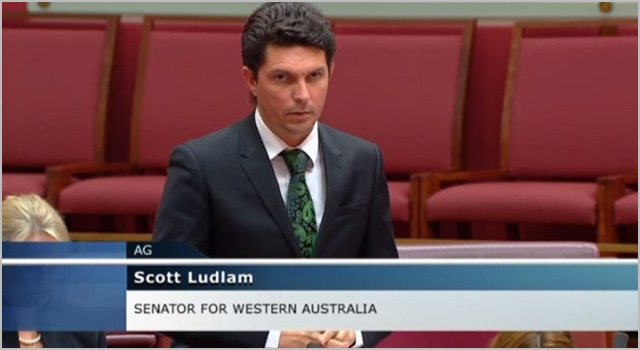
news Following several unsuccessful attempts, the Greens have successfully moved a motion in the Senate to establish a formal inquiry into Internet surveillance, through a review that will take place into the controversial Telecommunications (Interception and Access) Act.
Following a number of major revelations surrounding Australia’s electronic surveillance activities, especially associated with documents released by former NSA contractor and current whistleblower Edward Snowden, the Greens have since November been calling for the Federal Parliament to hold a wide-ranging inquiry into Australia’s electronic surveillance efforts.
In a speech in the Senate last week, Greens Senator Scott Ludlam pointed out that other major countries had already initiated inquiries following Snowden’s revelations. “The European parliament is extremely concerned about this,” he said. “It immediately established an inquiry on electronic mass surveillance, once the revelations had been made public by The Guardian and The Washington Post. The French, Canadian and German parliaments, and Westminster itself-all considered like-minded democracies-initiated inquiries immediately. This was followed by Brazil, Ecuador and many others. In the United States, the head of the NSA was called before congressional committees and told to explain himself.”
The Greens have, over the past several months, made several unsuccessful attempts to get an inquiry into surveillance practices by Australian intelligence and law enforcement agencies through the Senate. Today, the party announced they had finally succeeded. It appears Ludlam’s Senate Motion in this area was supported by Labor, which has suggested it was open to discussion on surveillance issues.
“The complicity of silence about surveillance in Australia broke today when we opened up an opportunity for Australian experts, agencies and individuals to participate in a conversation of what surveillance is necessary and proportionate,” said Ludlam in a statement.
“A review of the deeply flawed Telecommunications (Interception and Access) Act is well overdue. Amended no less than 45 times since the events of 11 September 2001, it is the tool used to bug and snoop on Australians. Since 2007 warrantless surveillance of Australians through access to telecommunications data has been possible, with requests of nearly 300,000 in the last financial year.”
“Since the revelations of Edward Snowden, the Senate has repeatedly voted to avoid knowing what is going on, until today failing in its primary duty as a parliament,” Ludlam added. “In May 2013 the Independent National Security Legislation Monitor concluded that several of the 80 hastily made changes to Australian law after the events of September 11 were not effective, appropriate or necessary.”
“The scope and reach of the laws were unprecedented, and included extraordinary powers of surveillance, detention and restriction and censorship on speech. This is a welcome first step to rein in surveillance overreach,” Ludlam concluded.
The news comes as existing oversight into the surveillance activities of Australia’s intelligence agencies has not appeared robust. Due to the sensitive nature of intelligence work, there are relatively few oversight mechanisms for agencies such as the Australian Signals Directorate, the Australian Security Intelligence Intelligence Organisation and the Australian Secret Intelligence Service.
One of those mechanisms, the Parliamentary Standing Committee on Intelligence and Security, has been out of action since the September election, as the Government has not yet re-established it. Labor and the Coalition voted this week not to support a Greens motion to re-establish the committee.
Another is the Inspector-General of Intelligence and Security. However, the Inspector-General confirmed this week that they had no plans to initiate a specific inquiry to examine some of the most controversial allegations currently being made in Australia — that the Australian Signals Directorate had offered to share data about Australian citizens with foreign intelligence agencies. The Inspector-General stated they believed current oversight of the ASD to be “sufficient”.
Image credit: Parliamentary Broadcasting

Almost missed this against the NBN debacle news.
Yay Green!
Renai, the PJCIS was re-established today. http://www.aph.gov.au/Parliamentary_Business/Committees/House_of_Representatives_Committees?url=pjcis/members.htm
The list of members doesn’t fill me with confidence though. :(
Unsurprisingly there are no independents or minor party members on that list. I won’t be surprised if the inquiry leads to more draconian laws being put in place.
This is why I avoid the main parties.
Thank you Ludlam.
Thank god Scott got back in after the recount…
He’s not in yet (the old senate is still sitting) wa goes to the polls in feb.
surveillance is necessary..!
Comments are closed.